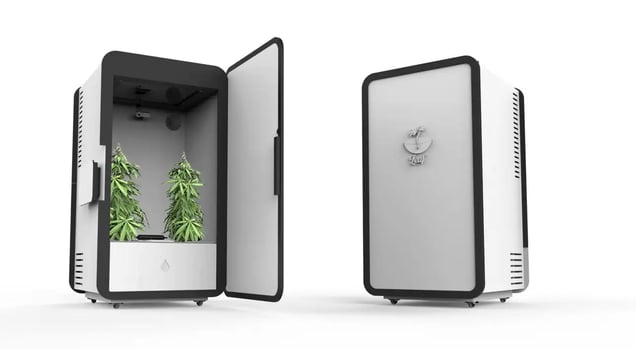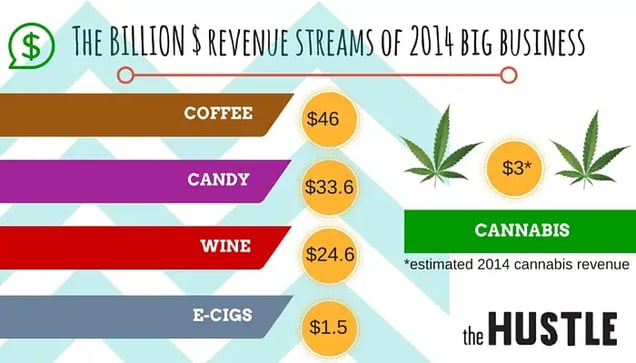Getting high is not what it used to be. Gone are the days of illicitly coughing up your lungs behind the garage. Today’s cannabis users inhale with designer vapes and attend $30 ganja yoga sessions clad in Lululemon.

Millennial marijuana smokers desire more than a headrush; they’re in it for the full experience. Enter a world where startups legally deliver pot to your door, and budtender positions are highly coveted.
Depending on which cannabis analyst you follow, the legal marijuana industry will be worth $13.4 billion, $20.7 billion or possibly $30 billion by 2020.
That’s pretty substantial.
This year the legal marijuana industry will generate an estimated $10 billion, according to Marijuana Business Daily’s report.
Surprisingly, $7 billion of that will be in “related cannabis products”
Not direct sales of cannabis – the accessory market is bigger than the bud.
Entrepreneurs are recognizing that there are big bucks to be made by supplying people with the cannabis tools they’re looking for. Or helping them create cannabis from scratch.
“It’s an amazing revolution happening and I couldn’t afford not to be a part of it,” 26-year-old Jonathan “Yoni” Ofir told me. Yoni’s the CEO of Leaf, a 7-month-old company that creates plug ‘n plant pot systems for cannabis home growers.
“Think of it as beautiful mini fridge filled with cannabis,” he said.
The Leaf machine looks more like a 3D printer than a one stop pot shop.

It’s a two by four box, with sleek lines and uses removable cartridges — which you load up with nutrients (you see the printer analogy right?). It can hold two plants and produce four ounces of marijuana per grow period, around three months.
Leaf’s controlled by a mobile app, and the home grower can set temperature, feed times and optimize their cannabis for maximum growth. Once Leaf’s connected to WiFi, the mobile app takes you through the setup process – and you can watch real time video of your plant growing through the installed camera.
But as big as Leaf looks, it’s actually discrete. Carbon filters mean that your house stays free from that pot smell, and the whole process — from growing to harvesting and drying, can be done inside inside its chamber.
Yoni says you can use it to grow vegetables, but I doubt anyone would pay $1,400 to make tomatoes.
“If you believe that fortune favors the bold, then now is the obvious time to enter cannabis,” consultant Rob Hunt from Consult Canna explained. “The orderly conversion from a black market to a legal market is going to create a great deal of wealth for those who enter the space early and build a strong footprint — in advance of major changes to Federal law.”

Yoni’s interest in cannabis was personal
He’d had a medical card when he lived in Los Angeles, and used cannabis to relax. He tried to grow his own (in California, anyone with a medical card is legally allowed to grow six cannabis plants) but that didn’t work out so well.
He found the process complicated. He needed specialist lights and a hydroponics system, and there was the pungent smell to deal with. He figured there must be an easier way to do this.
But he couldn’t find one. So he came up with Leaf.
“I didn’t want to create it, I wanted to use it!” he said, “There’s something powerful about being able to produce your own medicine, and I felt like it’s something anyone should be able to do.”

Yoni’s no entrepreneuring n00b. In 2011 he co-founded Alcohoot, a smartphone breathalyzer, which got acquired in 2014. Yoni was inspired by the alcohol-related accidents he’d seen during his time in the Israeli army.
“More soldiers died from drunk driving than in combat,” he told me.
Alcohoot gave Yoni a solid background in production and marketing, but he hadn’t anticipated the challenges of working in the weed world.
The word “cannabis” scares off many potential investors because they know the intricate legalities mean dealing with lots of paperwork.
“Regulatory is still scary for many investors,” Yoni said. “While we do see money coming in, it’s not easy to raise capital.”

To counter the cannabis founders’ conundrum, a number of incubators have been founded, dedicated specifically to helping the marijuana entrepreneur.
There are three big names to remember here

Green Labs Cannabis Coworking Incubator
Denver-based Green Labs opened in May 2014 as a co-working space and incubator for marijuana startups. They make Series A investments – $30,000 to $250,000 – in promising companies, and coach founders on revenue models and long-term strategies. Community is a big deal here; they hold regular themed nights. These include “Bend & Blaze” cannabis yoga, and sushi and joint rolling classes.

Texas Cannabis Industry Association Incubator
24-year-old Kayla Brown co-founded this early stage non-profit incubator in October 2014. This was to address the potential for cannabis startups in Texas. “There was no industry or business happening here,” she told me. But a number of legislative bills created an opportunity, and she wanted Texans to establish a cannabis industry.
Brown calls TCIA “a baby incubator,” and every startup works remotely, with regular calls with mentors and investors. They have 19 startups incubating, focused on a mix of products and software services. These startups include a cannabis recruitment firm, a cannabis law firm and a cannabis security company.

Canopy Boulder Seed Stage Bootcamp
Colorado-based Canopy Boulder, is a seed stage investment program for startups, whose inaugural class was March 2015. They run a three month bootcamp where founders get connected to industry leaders, engineers, and designers. They exchange a 9.5% stake for $20,000.
Canopy Boulder is focused on cannabis-related products, not dealing directly with the drug, which means they can escape from (some) regulatory headaches. They focus on helping unusual startups – and vaporizers don’t qualify, as the market is so saturated. To get accepted in the program, “You really have to have some truly unique evolution of that product to be competitive,” Canopy Boulder CEO, Patrick Rea, told Fast Company.
Some of the companies they’ve helped launch are Ganja boxes, a subscription service for cannabis lovers; Stashlogix, a product for discrete cannabis carrying; and CannaHacker, a media company that reports on marijuana-related news.
Yoni incubated Leaf here earlier this year.
With so many companies investing in cannabis, the future is looking green
Yoni credits this, in part, to how the media is is discussing marijuana. “It has been a taboo subject for many years,” he said. “But today mainstream media has changed the conversation to one of regular people. It doesn’t ruin your life, and people shouldn’t be imprisoned.”
This goes all the way to the White House.

Cannabis is a hot election topic. Where once you might ask a candidate if they’d smoked when they were young — thanks to Jeb Bush for admitting it! – now candidates get asked if they’re on the side of legalization. And voters use this information as part of their decision making. Just check out these rankings!
“It’s time to settle this nonsense!” Yoni said enthusiastically.
But he’s also realistic about the cannabis industry. When we talk about the numbers, they sound pretty impressive. $10 billion in profits this year, $13 to $35 billion by 2020. But if you put this in perspective of the wider consumer industry, the numbers aren’t that great.
In 2014, the American coffee industry made $46 billion, the candy industry $33.6 billion, and the wine industry $24.6 billion. But the new e-cigarette market clocked in at $1.5 billion in 2014 revenue, which shows hope for legal marijuana.

“There’s more hype than there is business,” Yoni said seriously. But it IS growing, and predictions of $35 billion are nothing to sneeze at.
This year, Yoni was one of TWO cannabis startups that presented at TechCrunch Disrupt. It’s likely we’ll see more next year.
Yoni’s business is banking on the demand for home growing with Leaf, but Canna consultant Rob Hunt is skeptical. “Why would most people take the time to have an indoor garden when you will have a store right down the street that will offer you the choice of hundreds of products?” he asked.
“You will always have your hobbyists, just like there will always be those that brew their own beer or make their own wine, or hunt and grow their own food, but the vast majority of people will prefer to purchase safe, legal, tested, and labeled products from a licensed retailer. “
That might be true, but even a small market can mean good revenue for a marijuana startup. Yoni won’t share the number of orders he’s taken, but his Facebook comments suggest a large number of people are excited. He’s scheduled to start shipping in 2016.
“Don’t hesitate, get off your ass,” is his advice to wannabe weed entrepreneurs.
“The people that do get off their ass, they’ll understand what I’m doing. You don’t have to have all the answers to start creating, as you go you’ll figure it out (taxes/lawyers). Trust yourself and you’ll get results but you need to take the first steps and build something.”










